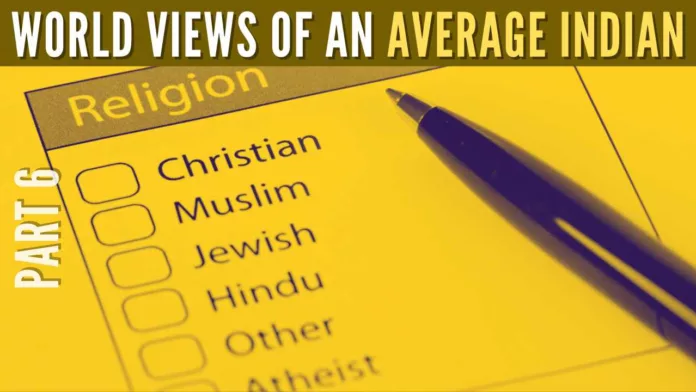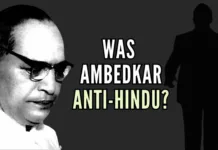
The previous 5 parts of the article can be accessed here Part 1, Part 2, Part 3, Part 4, Part 5. This is the sixth part
Inter-religious co-existence: Ways to get along
This article is a sequel to my previous piece, “Can the Divided World Be United?”[1], which addressed the global division along religious, political, and national lines, heading us toward dangerous times.
We all share the same world. Either we swim together or sink. I’m trying to share here, my world view on what we can do, as a first step, to collaborate and swim together.
Every religion (and philosophy, culture, and civilization) has evolved in response to the times and circumstances of its birth. Today, we also need to evolve as a society, with all our religions, cultures, and civilizations, in response to the prevailing times and circumstances.
Some founders of religions believed that their philosophies and tenets were divine revelations and that they were messengers of God. Some developed their beliefs to suit the needs of the society at that time. Some others advocated secular philosophies, urging society to establish rules for organized and civilized living.
The major religions today, along with their approximate number of followers, include:
- Christianity: 2.2 billion (about one-third of the world’s population).
- Muslims: 1.6 billion (about one-fourth of the world’s population).
- Atheists/ Non-religious people: 1.1 billion (about one-sixth of the world’s population).
- Hindus: 1 billion (about one-seventh of the world’s population).
- Buddhists: 500 million (about one-fourteenth of the world’s population).
Judaism, though not major, with only 16 million followers (one-500th of the world’s population), is in the news currently.
Judaism, Christianity, and Islam, all Abrahamic religions, originated with the worship of Abraham before branching into three separate religions and then subdividing into sects and sub-sects.
Christianity and Islam aimed to convert the world to their faiths and substantially succeeded, while religions like Hinduism and Judaism did not engage in widespread conversion.
Hinduism, characterized by its diversity, is considered a way of life evolved over millennia. It encompasses numerous versions, some with significant philosophical variances and others with minor differences. Even atheism is a part of Hinduism.
Buddhism, an offshoot of Hinduism, is a non-violent, egalitarian religion that rejects the concepts of God and idol worship. In several Asian countries, notably China, Buddhism was replaced by Communism, a political ideology.
Times have changed since the birth of all the major religions. We’re now living in the post-modern 21st century.
While the founders of these religions had noble intentions to improve the lives of their followers, their teachings have not been adapted to the changing times, and are sometimes becoming obstacles to peace, progress, and happiness.
A small minority of followers in most religions rigidly adhere to the literal interpretations of ancient doctrines, leading to disputes, conflicts, and wars, and even endangering human existence.
The Israel-Hamas/ Palestine conflict is a prime example of this. It stems from the hard-line stances taken by extremists on both sides, with other religious and political players taking sides. When one side feels threatened, hard-liners seek complete annihilation of the other side. This could only lead to mutually assured destruction.
In my previous article[1], I argued that well-intentioned moderates from all sides should come together to resolve such differences and conflicts amicably, excluding the hard-liners who thrive on discord.
Most religions and political entities are influenced by fundamentalist, extremist elements, leading to competitive rivalries and manipulation of the followers’ passions, to gain popular perception in their respective faiths and countries, regardless of the economic progress of the people. This also leads to corruption involving religious, political, and in some countries, military leaders.
However, thankfully, there are at least a small percentage of moderates in every religion striving to interpret their scriptures in line with current times to prevent conflicts and wars.
Moderates tend to be less dominant and assertive, while extremists wield louder influence. The silent majority, even if they agree with moderates, fear taking a stand against the extremists.
To prevent disaster, we must replace competitive rivalry by a principle of collaborative co-existence. Religious fanaticism not only leads to rivalries, disputes, conflicts, and wars among nations, cultures, civilizations, and races but also poses the real threat of nuclear war, as nuclear arms have proliferated to the hands of extremist regimes too.
Reclaiming space from religious extremists is challenging and almost impossible, given the hard positions of heads of religions, political ideologies and nations who matter, but a beginning is required, however small.
Perhaps, a simple beginning could be a demonstration of the intent at problem solving rather than problem aggravation which is the default direction in which the world is moving.
For instance, moderates of all faiths (including non-believers) can collectively engage in a one-minute joint prayer in their homes once a week (e.g., every Sunday at 4:00 p.m. local time worldwide) for world peace, prosperity, and harmony among all religions.
This innocuous call for prayer should spread virally across the globe, with followers from all religions participating. An Inter-Faith Council could coordinate this joint prayer, offering religion-neutral and nation-neutral prayer in all languages.
Social media should be utilized effectively by getting the silent majority to speak up for peace, even if only anonymously, against extremist posts.
The growth of this inter-faith community prayer will send a clear message to both the silent majority and hard-line extremists that most people of all faiths seek peace over violence.
Strengthened by this unity, moderates can take further steps to seek mediation as a way to resolve differences and conflicts.
Will this solve the problem?
No doubt, this may be a long shot, but it is better than silence. The sooner we do this, the better. Whoever agrees with this idea can play a role in this by popularizing this initiative.
The journey of a thousand miles begins with a single step. It will, at the very least, facilitate a pause, and unite moderates across all religions. Over time, this could pave the way for mutual co-existence of all religions.
Note:
1. Text in Blue points to additional data on the topic.
2. The views expressed here are those of the author and do not necessarily represent or reflect the views of PGurus.
References:
[1] Can the divided world be united – Oct 16, 2023, PGurus.com
For all the latest updates, download PGurus App.
- How BJP can get 33%+ vote share in TN - April 1, 2024
- A transparent, equitable electoral funding alternative - March 19, 2024
- How TN BJP can come to No. 1 or No. 2 in 2024 LS polls - January 11, 2024











Fully agree with Ganesan Subramaniam
It should be written in constitution that religion of Bharat is Hinduism